



Complexity There is no absolute definition of what complexity means, the only consensus among researchers is that there is no agreement about the specific definition of complexity. However, a characterization of what is complex is possible.[1] Complexity is generally used to characterize something with many parts where those parts interact with each other in multiple ways. The study of these complex linkages is the main goal of complex systems theory. In science,[2] there are at this time a number of approaches to characterizing complexity, many of which are reflected in this article. Neil Johnson admits that "even among scientists, there is no unique definition of complexity - and the scientific notion has traditionally been conveyed using particular examples..." Overview[edit] Definitions of complexity often depend on the concept of a "system"—a set of parts or elements that have relationships among them differentiated from relationships with other elements outside the relational regime.
COMPLEXITY THEORY AND MANAGEMENT PRACTICE by JONATHAN ROSENHEAD | Home | Contents | Join the Discussion Forum | Rationale | Interesting Links | Feedback | Search | Jonathan Rosenhead There is some evidence of managerial take-up of ‘complexity’ as a framework for informing organisational practice. This is still at an early stage, and take-up may or may not lead to take-off. what failings in current management theory or practice are claimed to be corrected? I will first provide the briefest of overviews of the subject matter of chaos and complexity theory, followed by an outline of the ways in which they have been applied to the field of management. Keywords: Complexity, chaos, management, analogy, metaphor, Darwin Copyright: © Jonathan Rosenhead 1998 Jonathan Rosenhead 1. Complexity and chaos theory have already generated an impressive literature, and a specialised vocabulary to match. The more general name for the field is complexity theory (within which ‘chaos’ is a particular mode of behaviour). 2. The list is longer. 3. 3.1 General lessons